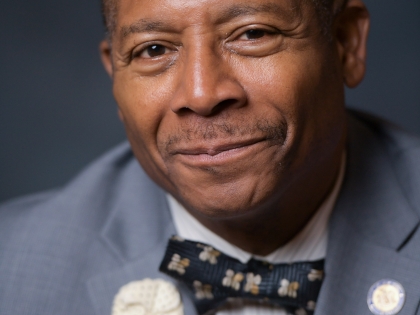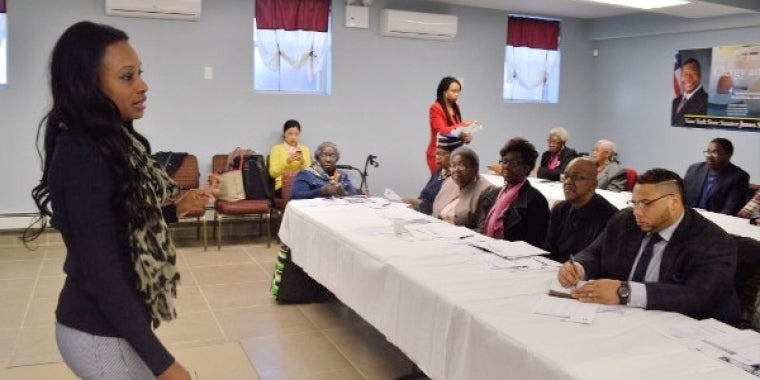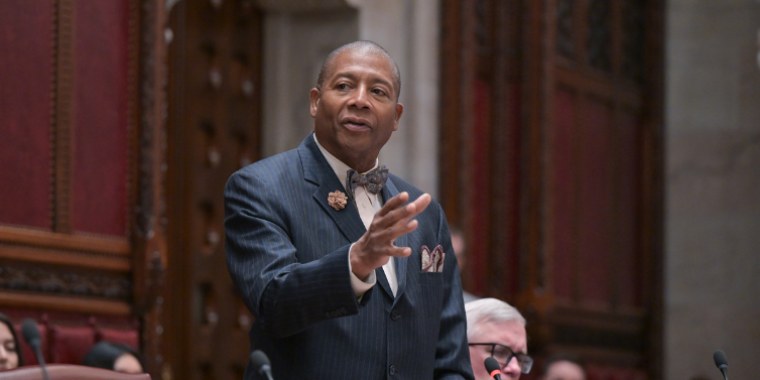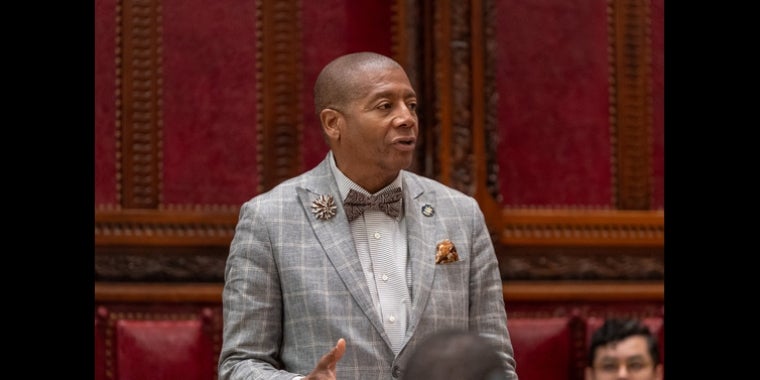
Mental Health and Economics Leads Discussion at Senator Sanders' Community Clergy Breakfast
October 25, 2018

Senator James Sanders Jr. (D-Rochdale Village, Far Rockaway) held his monthly Community Clergy Breakfast on October 25, 2018 at the First Church of God in Far Rockaway where the discussion focused on gaining a better understanding of mental health and it's impact on people's lives. Senator Sanders was inspired to highlight this topic after discovering an article describing the link between good mental health and increased economic productivity. Improving economic development in the district is a priority for Senator Sanders and has been a reoccurring theme at several clergy breakfasts.
"We all know it is important to take care of our physical health, but is just as important to take care of our mental health," Sanders said. "Sometimes it's not easy to recognize when stress, anxiety or sadness cross the boundary from a temporary problem to the symptom of a prolonged disorder and that's what we are here to learn today. Treatment is available, help is available, and it is important to me that you know about these resources."
The core of this month's presentation was the city's ThriveNYC program. Launched in 2015, it includes 54 initiatives aimed at changing the way the public thinks about mental health and the way our city's government and its partners provide care. The guest speaker was Malycia Jarrett Gordon, trainer in Mental Health and First Aid, with the NYC Department of Health and Mental Hygiene, one of the agencies that oversees ThriveNYC.
The discussion included defining different types of mental illness including symptoms, their prevalence in the United States, different types of treatment and their effectiveness, the stigma associated with having mental illness and how it prevents people from seeking help, and how to recognize mental illness in others, like a friend or co-worker, and what to do to assist them.
Jarrett Gordon explained that mental illness impairs one's ability to live, love, laugh and learn, what she referred to as the four L's. She also stated that depression can be distinguished from sadness by the duration that someone experiences those feelings. For example, more than two weeks of sadness without explanation could be a sign of something more serious. However, two weeks of sadness following the death of a loved one would be considered a normal response.
The presentation included several interactive exercises, one featured a mental health opinions quiz, that contained various statements and asked respondents whether they "agree, disagree or don't know" regarding examples like: "A first-aider can distinguish between a panic attack and a heart attack." The answer to that is no, according to Jarrett Gordon, because the two can have similar symptoms such as heart palpitations.
During another exercise participants were given a piece of paper with an illness (mental or physical) written on it and then they were asked to line up in the order of what they believed was the severity of the illness (with regard to effect on ability to function), with the understanding that the person with the illness was receiving treatment. The results were then compared to the actual findings from the World Health Organization.
Jarrett Gordon also went over helpful and unhelpful things to say to someone with depressive and / or anxiety symptoms. For example, a helpful thing to say would be "I am concerned about you," or "How long have you been feeling like this?" whereas an unhelpful thing to say would be "It's such a beautiful day outside. How can you feel so sad?" or "Pull yourself together."
For those who would like to learn more, ThriveNYC offers a free eight-hour Mental Health First Aid (MHFA) training to all New Yorkers. For more information, or to register, go online to
https://mhfa.cityofnewyork.us/
We would like to extend a special thank you to the First Church of God for allowing us to use their space and for co-sponsoring the event.



